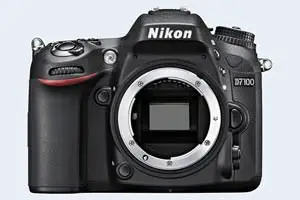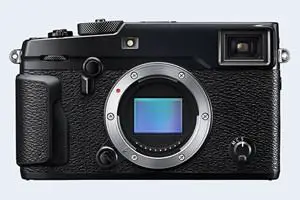Nikon D7100 vs Fujifilm X-Pro2
The Nikon D7100 and the Fujifilm X-Pro2 are two enthusiast cameras that were announced, respectively, in February 2013 and January 2016. The D7100 is a DSLR, while the X-Pro2 is a mirrorless interchangeable lens camera. Both cameras are equipped with an APS-C sensor. Both cameras offer a resolution of 24 megapixels.
Below is an overview of the main specs of the two cameras as a starting point for the comparison.

Check D7100 offers at
ebay.com

Check X-Pro2 offers at
ebay.com
Going beyond this snapshot of core features and characteristics, what are the differences between the Nikon D7100 and the Fujifilm X-Pro2? Which one should you buy? Read on to find out how these two cameras compare with respect to their body size, their imaging sensors, their shooting features, their input-output connections, and their reception by expert reviewers.
Body comparison
The physical size and weight of the Nikon D7100 and the Fujifilm X-Pro2 are illustrated in the side-by-side display below. The two cameras are presented according to their relative size. Three consecutive views from the front, the top, and the rear side are shown. All size dimensions are rounded to the nearest millimeter.
The X-Pro2 can be obtained in two different colors (black, graphite), while the D7100 is only available in black.
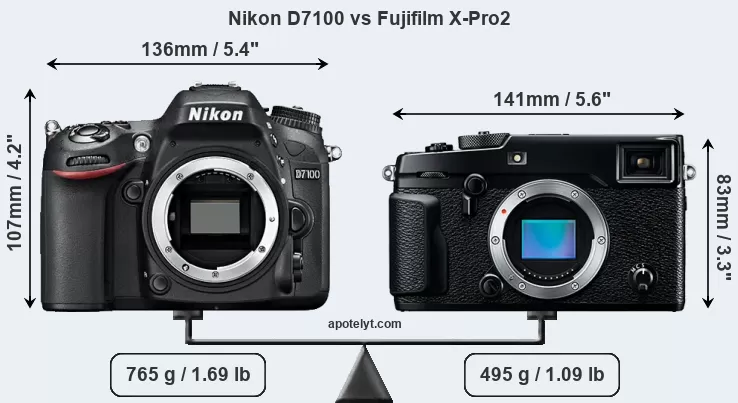

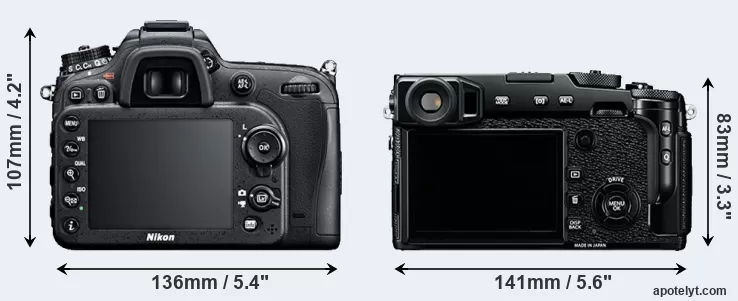
If the front view area (width x height) of the cameras is taken as an aggregate measure of their size, the Fujifilm X-Pro2 is notably smaller (20 percent) than the Nikon D7100. Moreover, the X-Pro2 is substantially lighter (35 percent) than the D7100. In this context, it is worth noting that both cameras are splash and dust-proof and can, hence, be used in inclement weather conditions or harsh environments.
The above size and weight comparisons are to some extent incomplete since they do not consider the interchangeable lenses that both of these cameras require. Both cameras have similarly sized sensors, but DSLRs have a larger flange-to-focal plane distance than mirrorless cameras, which imposes contraints on the optical engineering process and generally leads to bigger and heavier lenses. You can compare the optics available for the two cameras in the Nikon Lens Catalog (D7100) and the Fujinon X Lens Catalog (X-Pro2). Mirrorless cameras, such as the X-Pro2, have moreover the advantage that they can use many lenses from other systems via adapters, as they have a relatively short flange to focal plane distance.
Concerning battery life, the D7100 gets 950 shots out of its Nikon EN-EL15 battery, while the X-Pro2 can take 350 images on a single charge of its Fujifilm NP-W126 power pack.
The following table provides a synthesis of the main physical specifications of the two cameras and other similar ones. If you would like to visualize and compare a different camera combination, you can navigate to the CAM-parator app and make your selection from a broad list of cameras there.

| # | Camera Model |
Camera Width |
Camera Height |
Camera Depth |
Camera Weight |
Battery Life |
Weather Sealing |
Camera Launch |
Launch Price (USD) |
Street Price |
|
|---|---|---|---|---|---|---|---|---|---|---|---|
| 1. | Nikon D7100 | 136 mm | 107 mm | 76 mm | 765 g | 950 | Y | Feb 2013 | 1,199 | ebay.com | |
| 2. | Fujifilm X-Pro2 | 141 mm | 83 mm | 46 mm | 495 g | 350 | Y | Jan 2016 | 1,699 | ebay.com | |
| 3. | Canon 70D | 139 mm | 104 mm | 79 mm | 755 g | 920 | Y | Jul 2013 | 1,199 | ebay.com | |
| 4. | Fujifilm X100V | 128 mm | 75 mm | 53 mm | 478 g | 420 | Y | Feb 2020 | 1,399 | ebay.com | |
| 5. | Fujifilm X-Pro3 | 141 mm | 83 mm | 46 mm | 497 g | 440 | Y | Oct 2019 | 1,799 | amazon.com | |
| 6. | Fujifilm X-T3 | 133 mm | 93 mm | 59 mm | 539 g | 390 | Y | Sep 2018 | 1,499 | ebay.com | |
| 7. | Fujifilm X-T2 | 133 mm | 92 mm | 49 mm | 507 g | 340 | Y | Jul 2016 | 1,599 | ebay.com | |
| 8. | Fujifilm X-Pro1 | 140 mm | 82 mm | 43 mm | 450 g | 300 | n | Jan 2012 | 1,699 | ebay.com | |
| 9. | Nikon D7500 | 136 mm | 104 mm | 73 mm | 720 g | 950 | Y | Apr 2017 | 1,299 | amazon.com | |
| 10. | Nikon D500 | 147 mm | 115 mm | 81 mm | 860 g | 1240 | Y | Jan 2016 | 1,999 | ebay.com | |
| 11. | Nikon D7200 | 136 mm | 107 mm | 76 mm | 765 g | 1110 | Y | Mar 2015 | 1,199 | ebay.com | |
| 12. | Nikon D750 | 141 mm | 113 mm | 78 mm | 750 g | 1230 | Y | Sep 2014 | 2,299 | ebay.com | |
| 13. | Nikon D3300 | 124 mm | 98 mm | 76 mm | 430 g | 700 | n | Jan 2014 | 499 | ebay.com | |
| 14. | Nikon D610 | 141 mm | 113 mm | 82 mm | 850 g | 900 | Y | Oct 2013 | 1,999 | ebay.com | |
| 15. | Nikon D600 | 141 mm | 113 mm | 82 mm | 850 g | 900 | Y | Sep 2012 | 2,099 | ebay.com | |
| 16. | Nikon D7000 | 132 mm | 105 mm | 77 mm | 780 g | 1050 | Y | Sep 2010 | 1,499 | ebay.com | |
| 17. | Sony RX10 | 129 mm | 88 mm | 102 mm | 813 g | 420 | Y | Oct 2013 | 1,299 | ebay.com | |
| Note: Measurements and pricing do not include easily detachable parts, such as add-on or interchangeable lenses or optional viewfinders. | |||||||||||
Any camera decision will obviously take relative prices into account. The listed launch prices provide an indication of the market segment that the manufacturer of the cameras have been targeting. The D7100 was launched at a markedly lower price (by 29 percent) than the X-Pro2, which puts it into a different market segment. Usually, retail prices stay at first close to the launch price, but after several months, discounts become available. Later in the product cycle and, in particular, when the replacement model is about to appear, further discounting and stock clearance sales often push the camera price considerably down. Then, after the new model is out, very good deals can frequently be found on the pre-owned market.
Sensor comparison
The size of the imaging sensor is a crucial determinant of image quality. All other things equal, a large sensor will have larger individual pixel-units that offer better low-light sensitivity, wider dynamic range, and richer color-depth than smaller pixels in a sensor of the same technological generation. Furthermore, a large sensor camera will give the photographer more possibilities to use shallow depth-of-field in order to isolate a subject from the background. On the downside, larger sensors are more costly to manufacture and tend to lead to bigger and heavier cameras and lenses.
Both cameras under consideration feature an APS-C sensor, but their sensors differ slightly in size. They nevertheless have the same format factor of 1.5. Both cameras have a native aspect ratio (sensor width to sensor height) of 3:2.
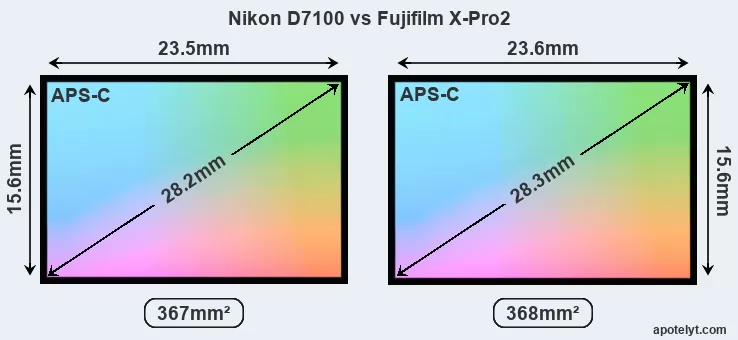
Even though the X-Pro2 has a slightly larger sensor, both cameras offer the same resolution of 24 megapixels. This implies that the X-Pro2 has a lower pixel density and marginally larger individual pixels (with a pixel pitch of 3.92μm versus 3.91μm for the D7100), which gives it a potential advantage in terms of light gathering capacity. In addition, the X-Pro2 is much more recent (by 2 years and 10 months) than the D7100, and its sensor will have benefitted from technological advances during this time. Coming back to sensor resolution, it should be mentioned that neither of the two cameras has an anti-alias filter installed, so they are able to capture all the detail the sensor resolves.
The X-Pro2 has on-sensor phase detect pixels, which results in fast and reliable autofocus acquisition even during live view operation.
The Nikon D7100 has a native sensitivity range from ISO 100 to ISO 6400, which can be extended to ISO 50-25600. The corresponding ISO settings for the Fujifilm X-Pro2 are ISO 200 to ISO 12800, with the possibility to increase the ISO range to 100-51200.
Technology-wise, both cameras are equipped with CMOS (Complementary Metal–Oxide–Semiconductor) sensors. Like most digital cameras, the D7100 uses a Bayer filter for capturing RGB colors on a square grid of photosensors. In contrast, the X-Pro2 employs a more randomized X-Trans layout of photosites, which according to Fujifilm helps to minimize moiré.
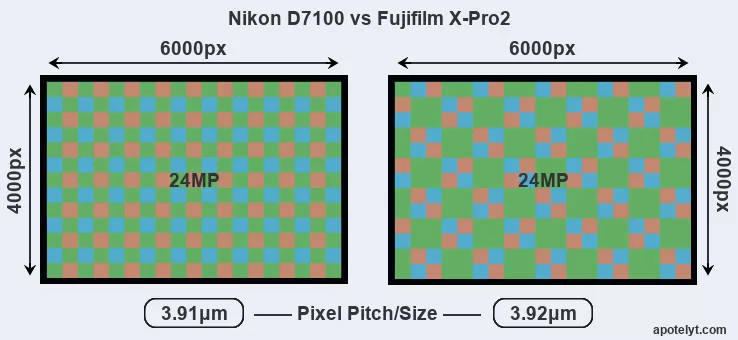
Since 2007, DXO Mark has published sensor performance measurements that have been derived using a consistent methodology. This service determines an overall sensor rating, as well as sub-scores for low-light sensitivity ("DXO Sports"), dynamic range ("DXO Landscape"), and color depth ("DXO Portrait"). The table below summarizes the physical sensor characteristics and sensor quality findings and compares them across a set of similar cameras.

| # | Camera Model |
Sensor Class |
Resolution (MP) |
Horiz. Pixels |
Vert. Pixels |
Video Format |
DXO Portrait |
DXO Landscape |
DXO Sports |
DXO Overall |
|
|---|---|---|---|---|---|---|---|---|---|---|---|
| 1. | Nikon D7100 | APS-C | 24.0 | 6000 | 4000 | 1080/60p | 24.2 | 13.7 | 1256 | 83 | |
| 2. | Fujifilm X-Pro2 | APS-C | 24.0 | 6000 | 4000 | 1080/60p | 23.7 | 13.0 | 1608 | 80 | |
| 3. | Canon 70D | APS-C | 20.0 | 5472 | 3648 | 1080/30p | 22.5 | 11.6 | 926 | 68 | |
| 4. | Fujifilm X100V | APS-C | 26.0 | 6240 | 4160 | 4K/30p | 24.2 | 13.6 | 1996 | 84 | |
| 5. | Fujifilm X-Pro3 | APS-C | 26.0 | 6240 | 4160 | 4K/30p | 24.1 | 13.6 | 1968 | 84 | |
| 6. | Fujifilm X-T3 | APS-C | 26.0 | 6240 | 4160 | 4K/60p | 24.0 | 13.4 | 1853 | 83 | |
| 7. | Fujifilm X-T2 | APS-C | 24.0 | 6000 | 4000 | 4K/30p | 23.8 | 13.1 | 1653 | 81 | |
| 8. | Fujifilm X-Pro1 | APS-C | 16.0 | 4896 | 3264 | 1080/24p | 23.1 | 12.3 | 1238 | 74 | |
| 9. | Nikon D7500 | APS-C | 20.7 | 5568 | 3712 | 4K/30p | 24.3 | 14.0 | 1483 | 86 | |
| 10. | Nikon D500 | APS-C | 20.7 | 5568 | 3712 | 4K/30p | 24.0 | 14.0 | 1324 | 83 | |
| 11. | Nikon D7200 | APS-C | 24.0 | 6000 | 4000 | 1080/60p | 24.5 | 14.6 | 1333 | 87 | |
| 12. | Nikon D750 | Full Frame | 24.2 | 6016 | 4016 | 1080/60p | 24.8 | 14.5 | 2956 | 93 | |
| 13. | Nikon D3300 | APS-C | 24.0 | 6000 | 4000 | 1080/60p | 24.3 | 12.8 | 1385 | 82 | |
| 14. | Nikon D610 | Full Frame | 24.2 | 6016 | 4016 | 1080/30p | 25.1 | 14.4 | 2925 | 94 | |
| 15. | Nikon D600 | Full Frame | 24.2 | 6016 | 4016 | 1080/30p | 25.1 | 14.2 | 2980 | 94 | |
| 16. | Nikon D7000 | APS-C | 16.1 | 4928 | 3264 | 1080/24p | 23.5 | 13.9 | 1167 | 80 | |
| 17. | Sony RX10 | 1-inch | 20.0 | 5472 | 3648 | 1080/60p | 22.9 | 12.6 | 474 | 69 | |
| Note: DXO values in italics represent estimates based on sensor size and age. | |||||||||||
Many modern cameras cannot only take still pictures, but also record videos. Both cameras under consideration are equipped with sensors that have a sufficiently high read-out speed for moving images, and both provide the same movie specifications (1080/60p).
Feature comparison
Beyond body and sensor, cameras can and do differ across a range of features. For example, the X-Pro2 has an electronic viewfinder (2360k dots), while the D7100 has an optical one. Both systems have their advantages, with the electronic viewfinder making it possible to project supplementary shooting information into the framing view, whereas the optical viewfinder offers lag-free viewing and a very clear framing image. The viewfinders of both cameras offer the same field of view (100%), but the viewfinder of the D7100 has a higher magnification than the one of the X-Pro2 (0.63x vs 0.39x), so that the size of the image transmitted appears closer to the size seen with the naked human eye. The adjacent table lists some of the other core features of the Nikon D7100 and Fujifilm X-Pro2 along with similar information for a selection of comparators.

| # | Camera Model |
Viewfinder (Type or 000 dots) |
Control Panel (yes/no) |
LCD Specifications (inch/000 dots) |
LCD Attach- ment |
Touch Screen (yes/no) |
Max Shutter Speed * |
Max Shutter Flaps * |
Built-in Flash (yes/no) |
Built-in Image Stab |
|
|---|---|---|---|---|---|---|---|---|---|---|---|
| 1. | Nikon D7100 | optical | Y | 3.2 / 1229 | fixed | n | 1/8000s | 6.0/s | Y | n | |
| 2. | Fujifilm X-Pro2 | 2360 | n | 3.0 / 1620 | fixed | n | 1/8000s | 8.0/s | n | n | |
| 3. | Canon 70D | optical | Y | 3.0 / 1040 | swivel | Y | 1/8000s | 7.0/s | Y | n | |
| 4. | Fujifilm X100V | 3690 | n | 3.0 / 1620 | tilting | Y | 1/4000s | 11.0/s | n | n | |
| 5. | Fujifilm X-Pro3 | 3690 | n | 3.0 / 1620 | tilting | Y | 1/8000s | 8.0/s | n | n | |
| 6. | Fujifilm X-T3 | 3690 | n | 3.0 / 1040 | full-flex | Y | 1/8000s | 11.0/s | n | n | |
| 7. | Fujifilm X-T2 | 2360 | n | 3.0 / 1040 | full-flex | n | 1/8000s | 8.0/s | n | n | |
| 8. | Fujifilm X-Pro1 | 1440 | n | 3.0 / 1230 | fixed | n | 1/4000s | 6.0/s | n | n | |
| 9. | Nikon D7500 | optical | Y | 3.2 / 922 | tilting | Y | 1/8000s | 8.0/s | Y | n | |
| 10. | Nikon D500 | optical | Y | 3.2 / 2359 | tilting | Y | 1/8000s | 10.0/s | n | n | |
| 11. | Nikon D7200 | optical | Y | 3.2 / 1229 | fixed | n | 1/8000s | 6.0/s | Y | n | |
| 12. | Nikon D750 | optical | Y | 3.2 / 1229 | tilting | n | 1/4000s | 6.0/s | Y | n | |
| 13. | Nikon D3300 | optical | n | 3.0 / 921 | fixed | n | 1/4000s | 5.0/s | Y | n | |
| 14. | Nikon D610 | optical | Y | 3.2 / 921 | fixed | n | 1/4000s | 6.0/s | Y | n | |
| 15. | Nikon D600 | optical | Y | 3.0 / 921 | fixed | n | 1/4000s | 5.5/s | Y | n | |
| 16. | Nikon D7000 | optical | Y | 3.0 / 921 | fixed | n | 1/8000s | 6.0/s | Y | n | |
| 17. | Sony RX10 | 1440 | Y | 3.0 / 1229 | tilting | n | 1/3200s | 10.0/s | Y | Y | |
| Note: *) Information refers to the mechanical shutter, unless the camera only has an electronic one. | |||||||||||
One difference between the cameras concerns the presence of an on-board flash. The D7100 has one, while the X-Pro2 does not. While the built-in flash of the D7100 is not very powerful, it can at times be useful as a fill-in light.
The reported shutter speed information refers to the use of the mechanical shutter. Yet, some cameras only have an electronic shutter, while others have an electronic shutter in addition to a mechanical one. In fact, the X-Pro2 is one of those camera that have an additional electronic shutter, which makes completely silent shooting possible. However, this mode is less suitable for photographing moving objects (risk of rolling shutter) or shooting under artificial light sources (risk of flickering).
The Nikon D7100 and the Fujifilm X-Pro2 both have an intervalometer built-in. This enables the photographer to capture time lapse sequences, such as flower blooming, a sunset or moon rise, without purchasing an external camera trigger and related software.
Concerning the storage of imaging data, both the D7100 and the X-Pro2 write their files to SDXC cards. Both cameras feature dual card slots, which can be very useful in case a memory card fails. The X-Pro2 supports UHS-II cards (on its first slot), while the D7100 can use UHS-I cards.
Connectivity comparison
For some imaging applications, the extent to which a camera can communicate with its environment can be an important aspect in the camera decision process. The table below provides an overview of the connectivity of the Nikon D7100 and Fujifilm X-Pro2 and, in particular, the interfaces the cameras (and selected comparators) provide for accessory control and data transfer.

| # | Camera Model |
Hotshoe Port |
Internal Mic / Speaker |
Microphone Port |
Headphone Port |
HDMI Port |
USB Port |
WiFi Support |
NFC Support |
Bluetooth Support |
|
|---|---|---|---|---|---|---|---|---|---|---|---|
| 1. | Nikon D7100 | Y | stereo / mono | Y | Y | mini | 2.0 | - | - | - | |
| 2. | Fujifilm X-Pro2 | Y | stereo / mono | Y | - | micro | 2.0 | Y | - | - | |
| 3. | Canon 70D | Y | stereo / mono | Y | - | mini | 2.0 | Y | - | - | |
| 4. | Fujifilm X100V | Y | stereo / mono | Y | - | micro | 3.1 | Y | - | Y | |
| 5. | Fujifilm X-Pro3 | Y | stereo / mono | Y | - | - | 3.1 | Y | - | Y | |
| 6. | Fujifilm X-T3 | Y | stereo / mono | Y | Y | micro | 3.1 | Y | - | Y | |
| 7. | Fujifilm X-T2 | Y | stereo / mono | Y | - | micro | 3.0 | Y | - | - | |
| 8. | Fujifilm X-Pro1 | Y | stereo / mono | - | - | mini | 2.0 | - | - | - | |
| 9. | Nikon D7500 | Y | stereo / mono | Y | Y | mini | 2.0 | Y | - | Y | |
| 10. | Nikon D500 | Y | stereo / mono | Y | Y | mini | 3.0 | Y | Y | Y | |
| 11. | Nikon D7200 | Y | stereo / mono | Y | Y | mini | 2.0 | Y | Y | - | |
| 12. | Nikon D750 | Y | stereo / mono | Y | Y | mini | 2.0 | Y | - | - | |
| 13. | Nikon D3300 | Y | mono / mono | Y | - | mini | 2.0 | - | - | - | |
| 14. | Nikon D610 | Y | mono / mono | Y | Y | mini | 2.0 | - | - | - | |
| 15. | Nikon D600 | Y | mono / mono | Y | Y | mini | 2.0 | - | - | - | |
| 16. | Nikon D7000 | Y | mono / mono | Y | - | mini | 2.0 | - | - | - | |
| 17. | Sony RX10 | Y | stereo / mono | Y | Y | micro | 2.0 | Y | Y | - |
It is notable that the D7100 has a headphone jack, which is not present on the X-Pro2 This port makes it possible to attach external headphones and monitor the quality of sound during the recording process.
Studio photographers will appreciate that the Fujifilm X-Pro2 (unlike the D7100) features a PC Sync socket, so that professional strobe lights can be controlled by the camera.
Both the D7100 and the X-Pro2 have been discontinued, but can regularly be found used on ebay. The D7100 was replaced by the Nikon D7200, while the X-Pro2 was followed by the Fujifilm X-Pro3. Further information on the features and operation of the D7100 and X-Pro2 can be found, respectively, in the Nikon D7100 Manual (free pdf) or the online Fujifilm X-Pro2 Manual.
Review summary
So what is the bottom line? Is the Nikon D7100 better than the Fujifilm X-Pro2 or vice versa? A synthesis of the relative strong points of each of the models is listed below.

Advantages of the Nikon D7100:
- Better sound control: Has a headphone port that enables audio monitoring while recording.
- Brighter framing: Features an optical viewfinder for clear, lag-free composition.
- Larger viewfinder image: Features a viewfinder with a higher magnification (0.63x vs 0.39x).
- Easier setting verification: Features an LCD display on top to control shooting parameters.
- Larger screen: Has a bigger rear LCD (3.2" vs 3.0") for image review and settings control.
- Longer lasting: Can take more shots (950 versus 350) on a single battery charge.
- Easier fill-in: Is equipped with a small onboard flash to brighten deep shadow areas.
- More affordable: Was introduced into a lower priced category (29 percent cheaper at launch).
- More heavily discounted: Has been available for much longer (launched in February 2013).

Arguments in favor of the Fujifilm X-Pro2:
- Better live-view autofocus: Features on-sensor phase-detection for more confident autofocus.
- More framing info: Has an electronic viewfinder that displays shooting data.
- More detailed LCD: Has a higher resolution rear screen (1620k vs 1229k dots).
- Faster burst: Shoots at higher frequency (8 vs 6 flaps/sec) to capture the decisive moment.
- Less disturbing: Has an electronic shutter option for completely silent shooting.
- More compact: Is smaller (141x83mm vs 136x107mm) and will fit more readily into a bag.
- Less heavy: Has a lower weight (by 270g or 35 percent) and is thus easier to take along.
- More legacy lens friendly: Can use many non-native lenses via adapters.
- Easier file upload: Has wifi built in for automatic backup or image transfer to the web.
- Better studio light control: Has a PC Sync socket to connect to professional strobe lights.
- Faster buffer clearing: Supports a more advanced SD data transfer standard (UHS-II vs UHS-I).
- More modern: Reflects 2 years and 10 months of technical progress since the D7100 launch.
If the count of individual advantages (bullet points above) is taken as a guide, the X-Pro2 emerges as the winner of the match-up (12 : 9 points). However, the relevance of individual strengths will vary across photographers, so that you might want to apply your own weighing scheme to the summary points when reflecting and deciding on a new camera. A professional wedding photographer will view the differences between cameras in a way that diverges from the perspective of a travel photog, and a person interested in cityscapes has distinct needs from a macro shooter. Hence, the decision which camera is best and worth buying is often a very personal one.
How about other alternatives? Do the specifications of the Nikon D7100 and the Fujifilm X-Pro2 place the cameras among the top in their class? Find out in the latest Best DSLR Camera and Best Mirrorless Interchangeable Lens Camera listings whether the two cameras rank among the cream of the crop.
In any case, while the comparison of technical specifications can provide a useful overview of the capabilities of different cameras, it says little about, for example, the shooting experience and imaging performance of the D7100 and the X-Pro2 in practical situations. User reviews that are available, for instance, at amazon can sometimes shed light on these issues, but such feedback is all too often partial, inconsistent, and inaccurate.
Expert reviews
This is why hands-on reviews by experts are important. The adjacent summary-table relays the overall verdicts of several of the most popular camera review sites (amateurphotographer [AP], cameralabs [CL], digitalcameraworld [DCW], dpreview [DPR], ephotozine [EPZ], photographyblog [PB]). As can be seen, the professional reviewers agree in many cases on the quality of different cameras, but sometimes their assessments diverge, reinforcing the earlier point that a camera decision is often a very personal choice.

| # | Camera Model |
AP score |
CL score |
DCW score |
DPR score |
EPZ score |
PB score |
Camera Launch |
Launch Price (USD) |
Street Price |
|
|---|---|---|---|---|---|---|---|---|---|---|---|
| 1. | Nikon D7100 | 5/5 | + + | .. | 85/100 | 4.5/5 | 4.5/5 | Feb 2013 | 1,199 | ebay.com | |
| 2. | Fujifilm X-Pro2 | .. | + | .. | 83/100 | 4.5/5 | 4.5/5 | Jan 2016 | 1,699 | ebay.com | |
| 3. | Canon 70D | 5/5 | + + | .. | 83/100 | 4.5/5 | 5/5 | Jul 2013 | 1,199 | ebay.com | |
| 4. | Fujifilm X100V | 5/5 | + + | 4.5/5 | 86/100 | 5/5 | 4.5/5 | Feb 2020 | 1,399 | ebay.com | |
| 5. | Fujifilm X-Pro3 | 4/5 | + | 4/5 | 85/100 | 4/5 | .. | Oct 2019 | 1,799 | amazon.com | |
| 6. | Fujifilm X-T3 | 5/5 | + + | 4.5/5 | 88/100 | 5/5 | 5/5 | Sep 2018 | 1,499 | ebay.com | |
| 7. | Fujifilm X-T2 | 5/5 | + + | .. | 86/100 | 4.5/5 | 5/5 | Jul 2016 | 1,599 | ebay.com | |
| 8. | Fujifilm X-Pro1 | 5/5 | + + | .. | 79/100 | 4.5/5 | 4.5/5 | Jan 2012 | 1,699 | ebay.com | |
| 9. | Nikon D7500 | 4.5/5 | + + | 4.5/5 | 86/100 | 5/5 | 4.5/5 | Apr 2017 | 1,299 | amazon.com | |
| 10. | Nikon D500 | 5/5 | + + | 4.7/5 | 91/100 | 4.5/5 | 5/5 | Jan 2016 | 1,999 | ebay.com | |
| 11. | Nikon D7200 | 4/5 | + + | .. | 84/100 | 4.5/5 | 4.5/5 | Mar 2015 | 1,199 | ebay.com | |
| 12. | Nikon D750 | 5/5 | + + | 4/5 | 90/100 | 4.5/5 | 4.5/5 | Sep 2014 | 2,299 | ebay.com | |
| 13. | Nikon D3300 | 3/5 | + | .. | 77/100 | 4.5/5 | 4.5/5 | Jan 2014 | 499 | ebay.com | |
| 14. | Nikon D610 | 4/5 | + + | .. | 87/100 | 4.5/5 | 4.5/5 | Oct 2013 | 1,999 | ebay.com | |
| 15. | Nikon D600 | 4/5 | + + | .. | 87/100 | 5/5 | 4.5/5 | Sep 2012 | 2,099 | ebay.com | |
| 16. | Nikon D7000 | 4/5 | .. | .. | 80/100 | 4.5/5 | 4.5/5 | Sep 2010 | 1,499 | ebay.com | |
| 17. | Sony RX10 | 5/5 | + | .. | 80/100 | 4.5/5 | 4.5/5 | Oct 2013 | 1,299 | ebay.com | |
| Note: (+ +) highly recommended; (+) recommended; (o) reviewed; (..) not available. | |||||||||||
The above review scores should be interpreted with care, though. The ratings were established in reference to similarly priced cameras that were available in the market at the time of the review. A score, therefore, has to be seen in close connection to the price and market introduction time of the camera, and rating-comparisons among cameras that span long time periods or concern very differently equipped models make little sense. Also, kindly note that some of the listed sites have over time developped their review approaches and their reporting style.

Check D7100 offers at
ebay.com

Check X-Pro2 offers at
ebay.com
Other camera comparisons
Did this review help to inform your camera decision process? In case you would like to check on the differences and similarities of other camera models, just use the search menu below. As an alternative, you can also directly jump to any one of the listed comparisons that were previously generated by the CAM-parator tool.
- Canon 300D vs Fujifilm X-Pro2
- Fujifilm X-E3 vs Nikon D7100
- Fujifilm X-Pro2 vs Fujifilm XQ1
- Fujifilm X-Pro2 vs Leica CL
- Fujifilm X-Pro2 vs Olympus E-P7
- Fujifilm X-Pro2 vs Olympus E-PM1
- Fujifilm X-Pro2 vs Sony A7C II
- Leica D-LUX 5 vs Nikon D7100
- Leica X Typ 113 vs Nikon D7100
- Nikon D2H vs Nikon D7100
- Nikon D5100 vs Nikon D7100
- Nikon D7100 vs Sony A9
Specifications: Nikon D7100 vs Fujifilm X-Pro2
Below is a side-by-side comparison of the specs of the two cameras to facilitate a quick review of their differences and common features.
| Camera Model | Nikon D7100 | Fujifilm X-Pro2 |
|---|---|---|
| Camera Type | Digital single lens reflex | Mirrorless system camera |
| Camera Lens | Nikon F mount lenses | Fujifilm X mount lenses |
| Launch Date | February 2013 | January 2016 |
| Launch Price | USD 1,199 | USD 1,699 |
| Sensor Specs | Nikon D7100 | Fujifilm X-Pro2 |
| Sensor Technology | CMOS | CMOS |
| Sensor Format | APS-C Sensor | APS-C Sensor |
| Sensor Size | 23.5 x 15.6 mm | 23.6 x 15.6 mm |
| Sensor Area | 366.6 mm2 | 368.16 mm2 |
| Sensor Diagonal | 28.2 mm | 28.3 mm |
| Crop Factor | 1.5x | 1.5x |
| Sensor Resolution | 24 Megapixels | 24 Megapixels |
| Image Resolution | 6000 x 4000 pixels | 6000 x 4000 pixels |
| Pixel Pitch | 3.91 μm | 3.92 μm |
| Pixel Density | 6.55 MP/cm2 | 6.52 MP/cm2 |
| Moiré control | no AA filter | no AA filter |
| Movie Capability | 1080/60p Video | 1080/60p Video |
| ISO Setting | 100 - 6,400 ISO | 200 - 12,800 ISO |
| ISO Boost | 50 - 25,600 ISO | 100 - 51,200 ISO |
| Image Processor | EXPEED 4 | X Processor Pro |
| DXO Sensor Quality (score) | 83 | .. |
| DXO Color Depth (bits) | 24.2 | .. |
| DXO Dynamic Range (EV) | 13.7 | .. |
| DXO Low Light (ISO) | 1256 | .. |
| Screen Specs | Nikon D7100 | Fujifilm X-Pro2 |
| Viewfinder Type | Optical viewfinder | Electronic viewfinder |
| Viewfinder Field of View | 100% | 100% |
| Viewfinder Magnification | 0.63x | 0.39x |
| Viewfinder Resolution | 2360k dots | |
| Top-Level Screen | Control Panel | no Top Display |
| LCD Framing | Live View | Live View |
| Rear LCD Size | 3.2inch | 3.0inch |
| LCD Resolution | 1229k dots | 1620k dots |
| LCD Attachment | Fixed screen | Fixed screen |
| Shooting Specs | Nikon D7100 | Fujifilm X-Pro2 |
| Focus System | Phase-detect AF | On-Sensor Phase-detect |
| Manual Focusing Aid | no Peaking Feature | Focus Peaking |
| Max Shutter Speed (mechanical) | 1/8000s | 1/8000s |
| Continuous Shooting | 6 shutter flaps/s | 8 shutter flaps/s |
| Electronic Shutter | no E-Shutter | up to 1/32000s |
| Time-Lapse Photography | Intervalometer built-in | Intervalometer built-in |
| Fill Flash | Built-in Flash | no On-Board Flash |
| Storage Medium | SDXC cards | SDXC cards |
| Single or Dual Card Slots | Dual card slots | Dual card slots |
| UHS card support | UHS-I | Single UHS-II |
| Connectivity Specs | Nikon D7100 | Fujifilm X-Pro2 |
| External Flash | Hotshoe | Hotshoe |
| Studio Flash | no PC Sync | PC Sync socket |
| USB Connector | USB 2.0 | USB 2.0 |
| HDMI Port | mini HDMI | micro HDMI |
| Microphone Port | External MIC port | External MIC port |
| Headphone Socket | Headphone port | no Headphone port |
| Wifi Support | no Wifi | Wifi built-in |
| Body Specs | Nikon D7100 | Fujifilm X-Pro2 |
| Environmental Sealing | Weathersealed body | Weathersealed body |
| Battery Type | Nikon EN-EL15 | Fujifilm NP-W126 |
| Battery Life (CIPA) | 950 shots per charge | 350 shots per charge |
| Body Dimensions |
136 x 107 x 76 mm (5.4 x 4.2 x 3.0 in) |
141 x 83 x 46 mm (5.6 x 3.3 x 1.8 in) |
| Camera Weight | 765 g (27.0 oz) | 495 g (17.5 oz) |

Check D7100 offers at
ebay.com

Check X-Pro2 offers at
ebay.com
Did you notice an error on this page? If so, please get in touch, so that we can correct the information.
